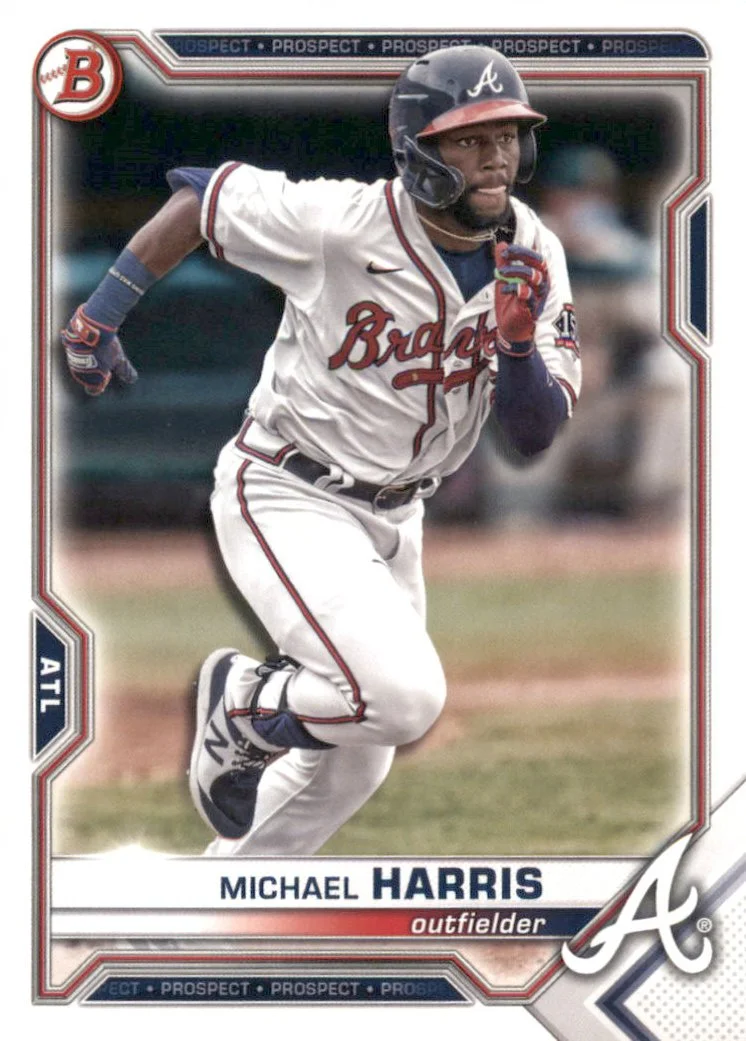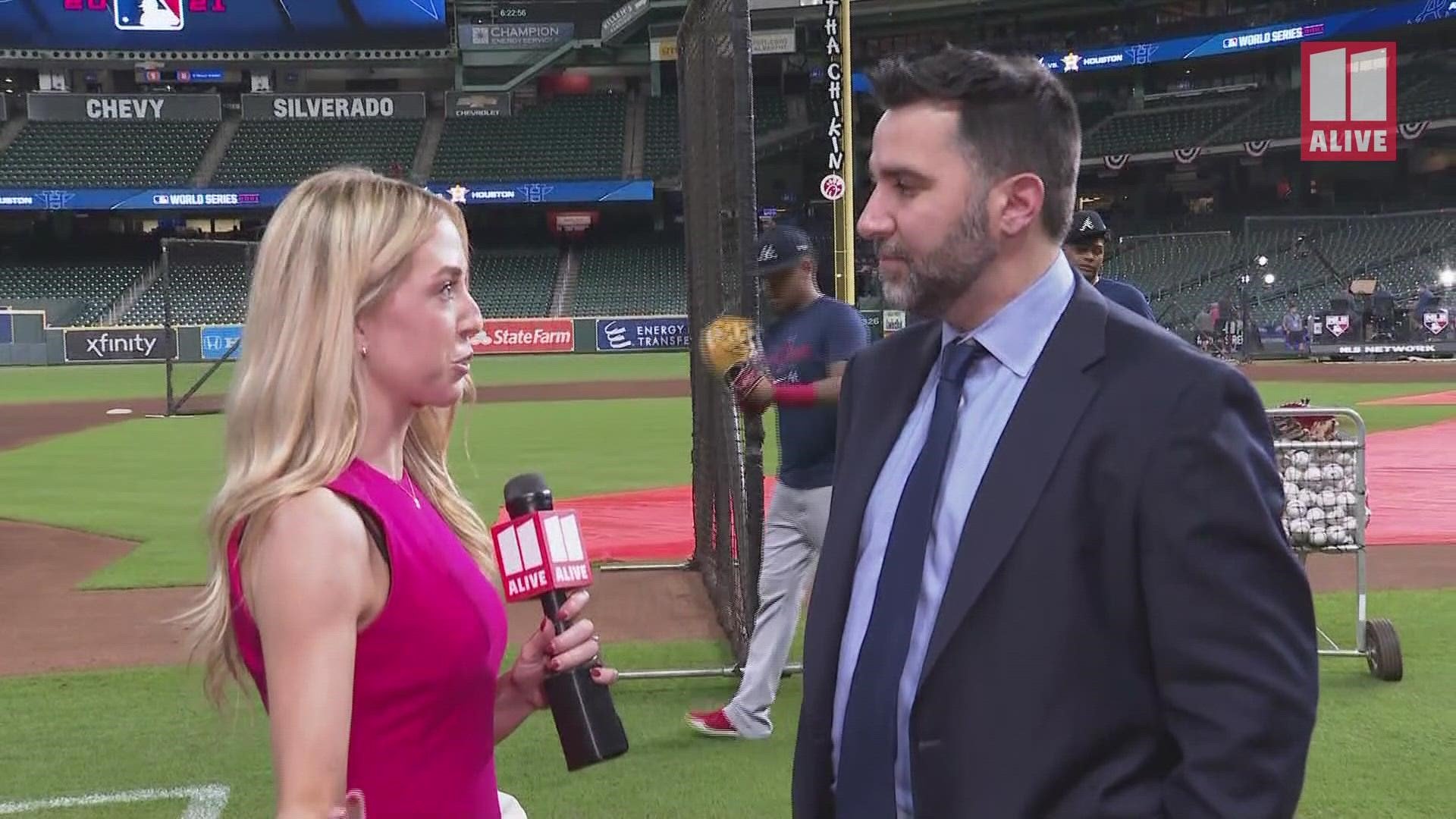Whicker: Braves continue sign 'em up, tie 'em up approach with Michael Harris
August 22, 2022
By Mark Whicker
Canadian Baseball Network
Michael Harris was the fourth pick by the Atlanta Braves in 2019.
Not the fourth-overall pick. The fourth pick that the Braves had, coming in the third round.
You didn’t need X-Ray vision to understand his talent. But Harris was not a unanimous projection. He was a talented left-hand pitcher with 93 mph stuff. Baseball America, the pulse of amateur and minor league baseball, reported that scouts weren’t unanimous on Harris’ “hit tool.”
Since Harris was from Stockbridge, Ga. and had been in several Atlanta showcases, the Braves knew him well. They drafted him and only needed to spend $547,000 to dissuade him from going to Texas Tech.
COVID-19 removed Harris’ inaugural season. In 2021, he spent the whole year in high-A Rome. On May 27 of this year, he was at double-A Mississippi, 381 miles from Truist Field. Harris made that trip the next day, when he was called up to fill in for the injured Ronald Acuna.
It took fewer than three months for Harris to earn a contract that says a lot about the Braves, and himself.
Last week Atlanta and Harris agreed on a $72-million deal for eight years. Harris is 21 and played only 147 minor league games. But in his first 74 games in Atlanta, Harris scorched the National League with 12 homers, 40 RBIs, a .500 slugging percentage and some of the finest centre-field play since Andruw Jones said goodbye.
Braves scouting director Dana Brown, former Toronto Blue Jays and Washington Nationals executive.
The Braves’ ability to find nuggets in a drainpipe is legendary, whether it’s Paul Snyder or Roy Clark or current scouting director Dana Brown who’s in charge. It’s how they built the teams that won 14 consecutive division titles and the 1995 World Series, and then constructed another championship team that crested last November.
Alex Anthopoulos (Montreal, Que.), the former Toronto Blue Jays general manager, is playing a longer game than anyone else in baseball. Before the Braves signed Harris, they committed $210 million over 10 years to 3B Austin Riley, who had just finished hitting .423 in July with 26 extra-base hits.
When Anthopoulos clearly understood that he was going to lose franchise belt buckle 1B Freddie Freeman to free agency, he did not give in to what became a daytime drama. He quickly acquired 1B Matt Olson, another Atlanta native, from Oakland and gave up prospects, including Shea Langeliers, the first-round pick in Harris’ draft.
Olson is 28, has 36 doubles, 25 home runs and 80 RBIs, is working on his third Gold Glove, and signed with the Braves through 2030, an eight-year, $168-million agreement.
Whether the Braves moved too quickly on Harris, who was in their contractual control for five years beyond this one, depends entirely on how real Harris is. He has given up all his arbitration years and even two free-agent seasons. It would not be unreasonable to assume those could have been $20-million-plus years for Harris, provided he is as good as his audition suggests. .
Same thing with Riley, who could have waited to become a free agent in 2026 but is currently signed through 2032. Riley’s peak seasons will bring him $22 million. That’s nowhere near what 3B Manny Machado ($30 million), 3B Nolan Arenado ($35 million) and frequent Angel spectator 3B Anthony Rendon will make in their best years. Rendon, in fact, pulls down $38 million each year from 2023 through 2026.
Atlanta started this by giving Ronald Acuna an eight-year $100 million annuity before Acuna had played one full season. The Braves have him through 2026 and have club options in each of the next two years. 2B Ozzie Albies is tied up through 2025 with club options in ‘26 and ‘27.
Anthopoulos believes in trades, too. They probably won him the Series last year. When Marcell Ozuna and Acuna were not available, he quickly seized outfielders Jorge Soler, Edwin Rosario, Joc Pederson and Adam Duvall. Rosario torched the Dodgers in the NLCS and Soler was the World Series MVP.
11-Alive’s Maria Martin interviews Braves general manager and president of baseball operations Alex Anthopoulos (Montreal, Que.) during the World Series. .
This year the priority was pitching, so Anthopoulos got closer Raisel Iglesias from the Angels and starter Jake Odorizzi from Houston.
But the story always returns to pitching and development. Spencer Strider joined the Braves’ rotation and threatens to take it over. He is 7-4 with a 3.04 ERA and has registered 142 strikeouts in 94 innings.
In need of emergency starters, the Braves called up a couple of former draft picks in August.
Kyle Muller beat the Marlins with five innings of three-hit pitching, and Bryce Elder, a former golfer at his Decatur, Tex. high school, also beat the Marlins with three hits over seven innings and 10 strikeouts.
It must be noted that Anthopoulos isn’t as generous with his pitchers as with his sluggers. Max Fried, the ace of the staff and the man who pitched the Series-clinching victory, is still working on a one-year contract, as is closer Kenley Jansen.
Charlie Morton becomes a free agent next year after he makes $20 million in 2022. But all those fresh arms give the Braves the ability, theoretically, to pick and choose.
Back in the spring, after the Dodgers signed Freeman, star struck reporters wondered how a team with four former MVPs (Mookie Betts, Cody Bellinger, Clayton Kershaw and Freeman) could be stopped. And since the Dodgers have the best record in baseball as August winds down, that’s still a fair question.
Soon they might also be asking how many future MVPs the Braves can muster. With a 75-48 record this year and with all those contracts stretching through the decade, Atlanta’s future is both now and tomorrow.



